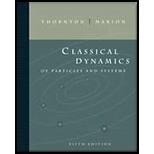
Classical Dynamics of Particles and Systems
5th Edition
ISBN: 9780534408961
Author: Stephen T. Thornton, Jerry B. Marion
Publisher: Cengage Learning
expand_more
expand_more
format_list_bulleted
Question
error_outline
This textbook solution is under construction.
Students have asked these similar questions
(a) The Hamiltonian for a system has the formH = 1/2 (1/q2+ p2q4)..Find the equation of motion for q.
(b) Find a canonical transformation that reduces H to the form of harmonic oscillator. Show that the solution for the transformed variables is suchthat the equation of motion found in part (a) is satisfied.
Consider a particle of spin s = 3/2.
(a) Find the matrices representing the operators S^
x
, S^
y
,S^
z
,
^
Sx
2
and ^
S y
2 within the basis of
^
S
2
and S^
z
(b) Find the energy levels of this particle when its Hamiltonian is given by
^H=
ϵ 0
h
2
( Sx
2−S y
2
)−
ϵ 0
h
( S^
Z )
where ϵ 0
is a constant having the dimensions of energy. Are these levels degenerate?
(c) If the system was initially in an eigenstate Ψ0=(
1
0
0
0)
, find the state of the system at time
Two mass points of mass m1 and m2 are connected by a string passing through a hole in a smooth table so that m1 rests on the table surface and m2 hangs suspended. Assuming m2 moves only in a vertical line, what are the generalized coordinates for the system? Write the Lagrange equations for for the system and, if possible, discuss the physical significance any of them might have. Reduce the problem to a single second-order differential equation and obtain a first integral of the equation. What is its physical significance? (Consider the motion only until m1 reaches the hole.)
Knowledge Booster
Similar questions
- For a one dimensional system, x is the position operator and p the momentum operator in the x direction.Show that the commutator [x, p] = iharrow_forwardIf Force B on the x-z plane is equal to 300N and h = 4m and v = 10m, then what is the i and k components of Force B?arrow_forwardLet f(x)= 4xex - sin(5x). Find the third derivative of this function. Note ex is denoted as e^x below. Select one: (12+4x^3)e^x + 125sin(5x) 12e^x + 125cos(5x) not in the list (12+4x)e^x + 125cos(5x) (8+4x)e^x + 25sin(5x)arrow_forward
- A point mass is constrained to move on a massless hoop of radius a fixedin a vertical plane that rotates about its vertical symmetry axis with constantangular speed ω. Obtain the Lagrange equations of motion assuming the only external forces arise from gravity. What are the constants of motion? Show that if ω is greater than a critical value ω0, there can be a solution in which the particle remains stationary on the hoop at a point other than at thebottom, but that if ω < ω0, the only stationary point for the particle is atthe bottom of the hoop. What is the value of ω0?arrow_forwardA frictionless table has a mass m on it. The table has a hole in it, where mass m is connected to a string that passes through the hole, attached to a hanging mass M.(a) What is the Lagrangian for this system? Using this Lagrangian, find the equations of motion (a = function of position) for each of the generalized coordinates used.(b) Under what conditions does m make a circular motion?(c) What is the frequency of small oscillations (in r) about this circular motion? Further, assume the oscillations are small: use a Taylor Expansion at the point we choose to use the small angle approximation.)arrow_forwardProve the following: if the Hamiltonian is independent of time, then ∆E doesn't change in time. Show work and be explicit to prove the statement.arrow_forward
arrow_back_ios
arrow_forward_ios
Recommended textbooks for you
 Classical Dynamics of Particles and SystemsPhysicsISBN:9780534408961Author:Stephen T. Thornton, Jerry B. MarionPublisher:Cengage Learning
Classical Dynamics of Particles and SystemsPhysicsISBN:9780534408961Author:Stephen T. Thornton, Jerry B. MarionPublisher:Cengage Learning

Classical Dynamics of Particles and Systems
Physics
ISBN:9780534408961
Author:Stephen T. Thornton, Jerry B. Marion
Publisher:Cengage Learning